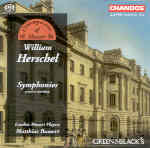German-born English composer William Herschel (1738-1822) achieved fame as an astronomer, the discoverer of the planet Uranus; but his formal training was musical, and in the early 1760s he composed a series of symphonies, six of which are featured here. They are attractive works in simple forms, all centered on the keys of C or D, scored for continuo, strings, winds, and occasional brass in various combinations. Each has three movements, and none lasts more than about 12 minutes. Not surprisingly, Nos. 14 and 17, which feature horns and timpani, pack the largest punch, and Herschel wrote some surprisingly memorable tunes (particularly in the allegros), making these slight works easy on the ear and, if a touch formulaic in construction, seldom dull.
Matthias Bamert and the London Mozart Players have a good time projecting this unchallenging music. Their playing is crisp, admirably light, and their judicious approach to repeats means that no single movement outstays its welcome. Sonically this DSD multichannel production represents Chandos’ best effort to date in the new medium. As with other releases in this initial batch, the engineers seem a bit overly fond of the center channel, but this does little harm in such lightly scored music, and the increase in timbral vividness and sonic realism over plain stereo is truly striking. It may be ear candy, but in measured doses Herschel’s music retains its ability to charm.
































